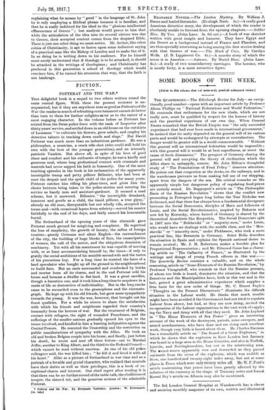FICTION.
POTTERAT AND THE WAR..
Tins delightful book is a sequel to two others written round the same central figure. With these the present reviewer is Un- acquainted, but if they are anywhere near as geodes Pofierot and the
War the reader in search of refreshing entertainment cannot do better than turn to them for further enlighter.ment as to the career of a most engaging character. In the volume before us Potterat has retired from the Swiss police force with the rank of Inspector after thirty years' service, and settled down in an old house on the outskirts of Lausanne "to cultivate his flowers, grow salads, and employ his detective talents in tracking down snails and slugs." But David Potterat was much more than an industrious gardener. He was a philosopher, a musician, a crack rifle-shot (who could still hold his
own with the best of the younger generation), and an intensely patriotic Vaudoia But above all, in spite of his love of good
cheer and comfort and his outbursts of temper, he was a kindly and generous soul, wheats long professional contact with criminals and wastrels had never sapped his faith in humanity. One of the most touching episodes in the book is his reclamation of the apparently incorrigible tramp and petty pilferer EWlisoire, who had been at once the despair and the spoilt child of the police for many years. Potterat catches him rifling his plum-trees, and gives him the choice between being taken to the police-station and entering his service as handy man and assistant-gardener. It seemed a mad scheme, but it answered. Belisaire, "the incorrigible drunkard, innocent and gentle as a child, the timid pilferer, a true gipey," already an old man, disreputable but not wholly vile, accepted the terms and—with occasional lapses from sobriety—served his master faithfully to the end of his days, and fairly earned his honourable burial.
The Switzerland of the opening years of this chronicle gave Potterat much ground for misgiving and complaint. He regretted the loss of simplicity, the growth of luxury, the influx of foreign tourists--greedy Germane and silent English—the encroachment of the city, the building of huge block's of flats, the emancipation of women, the cult of the motor, and the ubiquitous dominion of machinery. Yet with all his resentment he was capable of moving with, or at least accommodating himself to, the times—if only to gratify the social ambitions of his amiable second wife and the tastes of his precocious boy. For a long time he resisted the lures of a land speculator who bought up all the ground in the neighbourhood to build flats. But an oasis surrounded and overlooked by bricks and mortar loses all its charm, and in the end Potterat sold his house and became is dweller in fiat-land. It was a great sacrifice, though a lucrative one, and it took him a long time to acquiesce in a mode of life so destructive of individuality. But in the long run he came to be reconciled even to the gramophone and the cinemato- graph. He kept up with his old friends, but grew more sympathetic towards the young. It was the war, however, that brought out his finest qualities. For a while Ile strove to share the satisfaction with which his friends and neighbours regarded their country's immunity from the horrors of war. But the treatment of Belgium, contact with refugees, the eight of wounded Frenchmen, and the sufferings of the smaller nations gradually opened his eyes to the issues involved, and kindled in him a burning indignation against the Central Powers. He resented the Censorship and the restriction on public manifestations of sympathy with the Alike. He took an old and broken Belgian couple into his home, and finally, just before his death, he wrote and sent off three letters—one to Marshal Joffre, another to King Albert, and the third to the Federal Council— which cannot be read without emotion. As one of his old police colleagues said, the war killed him ; "lie felt it and lived it with all his heart." Alike as a picture of Switzerland in wartime and as a portrait of a lovable and genial character, who realized that neutrals have their duties as well as their privileges, this is a book of ex- ceptional charm and interest. Our chief regret after reading it is that there can be no further record of the table-talk, the ebullitions of temper, the shrewd wit, and the generous actions of the admirable Potterat.
• Potlend and Me Wm. By Benjamin Vallotton, Looks: W. Belnemann. neLl


































 Previous page
Previous page